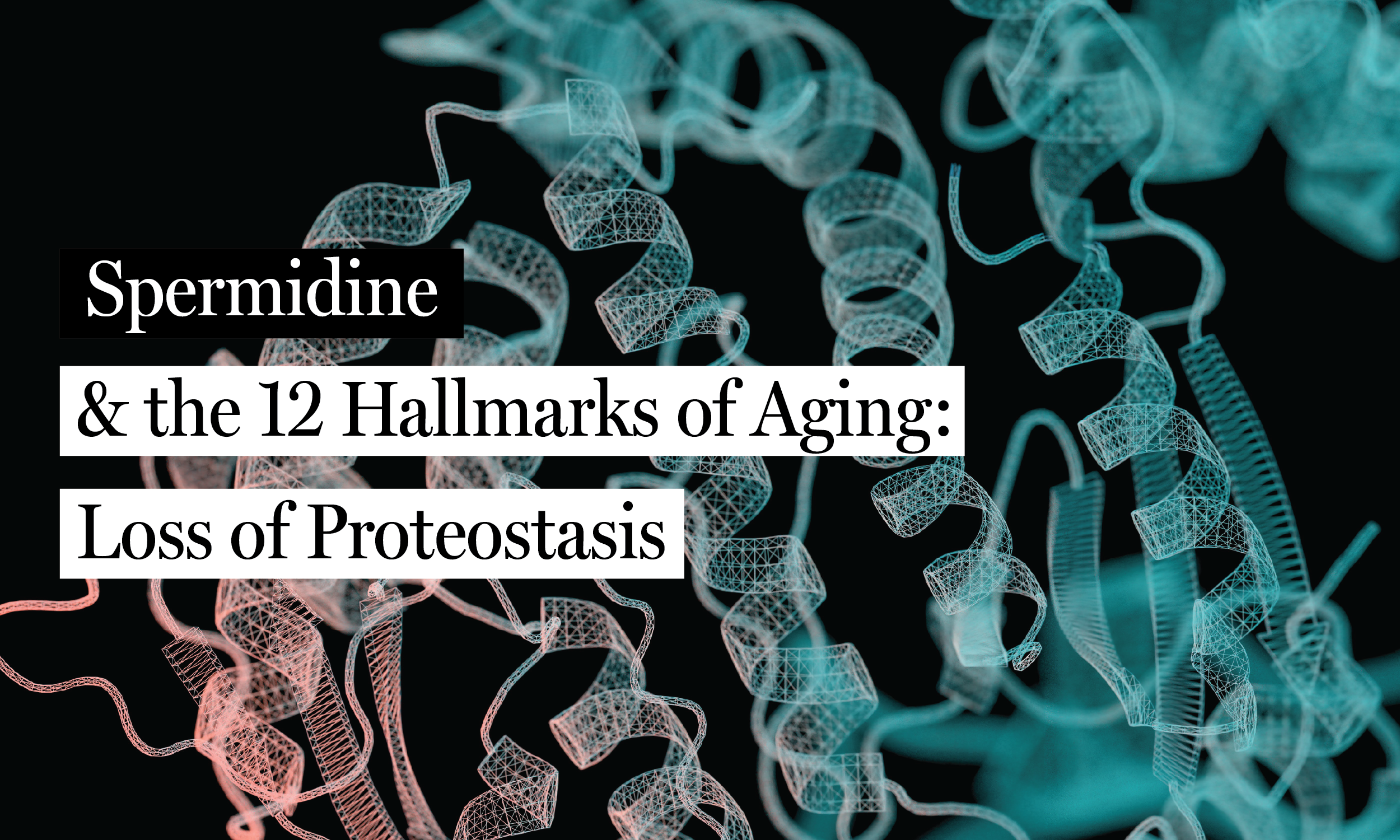
The fourth hallmark of aging is loss of proteostasis. Proteostasis is the delicate balance that keeps proteins in our cells properly synthesized, folded, and broken down. As we grow older, this balance starts to waver, causing proteins to become misfolded and dysfunctional. However, research has shown that spermidine, a naturally occurring compound, has the potential to support proteostasis and help promote healthy aging, offering hope for maintaining vitality as we age.
What is proteostasis?
Proteins are molecules that are coded by your DNA and drive nearly every function of your cells. Think of proteins as workers in a factory, each with a specific role to keep everything running smoothly. Your body builds proteins using instructions from your DNA, assembling them from smaller building blocks called amino acids, like snapping LEGO bricks together to create different structures. However, for proteins to work correctly, they must fold into the right shape. If they’re misfolded or damaged, they can’t do their job and may even cause harm.
That’s where proteostasis comes in: it’s your body’s quality-control system for proteins. Your cells are constantly making, folding, and recycling proteins to ensure everything functions correctly. When proteostasis is working well, your cells stay healthy. But when it breaks down, damaged proteins can build up, leading to aging and diseases. Maintaining proteostasis is crucial for overall health and longevity and it involves several mechanisms, including:
- Protein folding: ensuring newly synthesized proteins achieve their correct three-dimensional structure.
- Protein stabilization: maintaining the stability and function of proteins.
- Protein degradation: removing damaged or misfolded proteins through pathways like autophagy and the proteasome.
As we age, the body's ability to maintain proteostasis declines, causing an imbalance in protein quality control. This can lead to a buildup of misfolded proteins and toxic protein clumps, which interfere with normal cell function. Over time, this disruption contributes to various diseases, particularly neurodegenerative conditions like Alzheimer’s and Parkinson’s.
How spermidine supports proteostasis
- Induction of autophagy: Spermidine has been shown to enhance autophagy, which is crucial for clearing damaged proteins and organelles. By promoting autophagy, spermidine ensures that misfolded proteins are efficiently degraded and recycled and helps maintain proteostasis. This is essential for proper protein quality control, especially during aging.
- Enhancing mitochondrial function: Spermidine-induced autophagy also includes mitophagy, the selective degradation of damaged mitochondria. By improving mitochondrial quality control, spermidine supports optimal energy production and cellular metabolism, which are crucial for maintaining proteostasis.
- Enhancing chaperone-mediated protein folding: Spermidine has been linked to increased expression of molecular chaperones, which play a crucial role in maintaining protein integrity and preventing the harmful effects of misfolded proteins.
- Boosting proteasomal activity: Research indicates that spermidine may support the function of the ubiquitin-proteasome system (UPS), helping to remove damaged proteins more efficiently. The UPS is a crucial process in cells that works like a recycling system. Proteins that are damaged, misfolded, or no longer needed are tagged with a small molecule called ubiquitin, which acts like a "label" signaling that the protein needs to be broken down. These tagged proteins are then sent to the proteasome, a large complex that acts like a "protein shredder." The proteasome breaks down the unwanted proteins into smaller parts, which can be recycled to create new proteins. UPS is particularly important for preventing protein buildup in diseases like Alzheimer's and Parkinson's, where abnormal protein aggregates, such as amyloid plaques and tau tangles, are common.
- Stabilizing specific proteins: Spermidine can also improve protein stability by inhibiting the ubiquitination of certain proteins, such as tyrosinase-related proteins, as demonstrated in a study that suggests a potential treatment for hypopigmentation. This inhibition prevents their degradation via the proteasome, leading to increased levels and stability of these proteins. This is somewhat the opposite of the effect described in bullet point #4, as instead of promoting the breakdown of damaged proteins, spermidine's action here helps protect and stabilize specific proteins by reducing their degradation.
Spermidine’s protective role in neurodegenerative diseases: how enhancing proteostasis promotes brain health
Neurodegenerative diseases like Alzheimer’s and Parkinson’s are often linked to a decline in proteostasis. When this balance is disrupted, misfolded and toxic proteins accumulate and accelerate the progression of disease. Autophagy helps clear these harmful protein aggregates, supporting neuronal health and function. By inducing autophagy, spermidine supports proteostasis in neurodegenerative conditions by promoting the clearance of toxic protein aggregates. In a study with aging Drosophila, spermidine supplementation restores polyamine levels, enhances autophagy, and prevents the accumulation of toxic proteins, protecting against age-related memory decline. Additionally, another study showed that spermidine supplementation counteracts neurotoxicity linked to α-synuclein, a key protein implicated in Parkinson’s disease, in model organisms like fruit flies and nematodes. By promoting the degradation and recycling of harmful protein aggregates, spermidine helps preserve neuronal function and may serve as a potential therapeutic strategy for neurodegenerative diseases such as Alzheimer’s and Parkinson’s.
Keep your proteins in shape with spermidine
As we age, the loss of proteostasis plays a significant role in the decline of our health and the onset of age-related diseases. Fortunately, spermidine shows great promise in helping to reverse this process by promoting autophagy and supporting the delicate balance of proteins within our cells. By maintaining proteostasis, spermidine helps protect cellular function and encourages healthy aging. While the potential benefits of spermidine are exciting, we still need more research to understand the optimal dosages and elucidate the precise mechanisms behind its effects on proteostasis.
In the meantime, incorporating spermidine-rich foods into your diet or considering supplementation with a natural spermidine supplement could be a proactive step toward better health and longevity. Because now you know, keeping your proteins in shape is key to staying healthy!

(Adapted from López-Otín et al., 2022)
Curious about the other hallmarks of aging and how spermidine can help combat them? Read more here.







